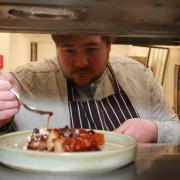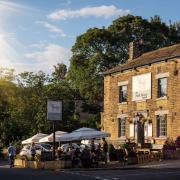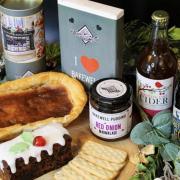Going full circle, Nik Cook returns to Thornbridge Brewery, the starting point of his seven year odyssey around the micro-breweries of Derbyshire

I can’t believe that it has been seven years since I started exploring the micro-breweries of Derbyshire. I’ve travelled the county visiting breweries sited in industrial estates, old farm buildings, garages and even a haunted pub. I’ve learned so much about this thriving industry and had the pleasure of sampling some outstanding beers. My journey is far from over, with new breweries opening all the time, but I thought now was the perfect time to re-visit where it had all started for me – Thornbridge.
When I first called in seven years ago, Thornbridge had just made the massive move from what was definitely a micro-brewery at Thornbridge Hall to the far more macro and high-tech Riverside Brewery on the outskirts of Bakewell. Now, as I joined the brewery’s export and marketing executive James Buchanan, and Mark Thomas, corporate affairs manager for Tesco in the North, for a tour of the brewery, it was obvious that growth had continued and even accelerated. A new state-of-the-art bottling line was whirring away, the number of fermentation tanks had significantly increased and the payroll now numbers 50 employees. With a high tech computerised control room, it’s a million miles from a micro brewery so I was intrigued how would James classify the brewery now.
‘Craft brewery is how we’re often described and how we’d describe ourselves. We’re independent and produce the beers we want to across a wide range of styles. We’re not a dedicated real ale brewery or a lager brewery, we do a vast range. Above anything else we’re a brewery that produces consistently great beer.’
A recent major stepping point in Thornbridge’s growth has been securing distribution through Tesco. Mark Thomas, from the supermarket giant, explained how that has happened.

‘We deal with lots of different breweries of varying sizes and the concern when you launch a line is whether the product can be delivered. We might start a small brewery in just a few stores but we know with Thornbridge that the capacity is there to expand substantially in response to customer demand. We’re over the moon to be part of the Thornbridge success story.’
You only have to look at the range of beers that Thornbridge has produced to realise that despite this expansion and commercial success, craft, innovation and experimentation are still priorities. This was highlighted when we entered the impressive barrel ageing room. Full of wine, whiskey and bourbon barrels, all imparting their unique magic to the beers they contain, this definitely isn’t a sell-out commercial brewery that just churns out tried and tested recipes. The original Hall Brewery is still an active hub of experimentation and small batch beers and, as James explained, you can still expect the unexpected from Thornbridge.
‘Although Jaipur is multi-award winning – it probably constitutes about 30 per cent of what we brew and is incredibly popular – we don’t want to get bored. We enjoy creating new beers, trying new styles and pushing the boundaries. A great example of this is Serpent, which we’ve collaborated on with Brooklyn Brewery and Oliver’s Cider. It’s a Belgian inspired golden ale that’s barrel-aged with cider lees for a year. As far as we know it’s totally unique. Having a barrel store like ours is a big investment in terms of time and money but the results are fantastic, definitely worth it and we’re incredibly proud of them.’
In the seven years since my last visit, there has been a craft beer revolution. CAMRA recently went on record as saying that their job is now effectively done, and it’s unusual these days to go into a pub and not find some good and interesting beer. Accompanying this revolution, and fuelled by CAMRA, was a ‘cask is good, keg is bad’ mindset. However, with breweries such as Thornbridge now selling many of its beers in keg form, are keg beers now acceptable?

‘Cask beer, or real ale as it’s sometimes known, will actually go through a fermentation in the cask. This fermentation gives the beer its carbonation and contributes to its characteristics. It’ll have a fairly short shelf life of 6-8 weeks depending on the beer, it has to be properly settled by the landlord and then it’s hand pumped. With keg beers, there’s no fermentation and they’re force carbonated. This makes them fizzier and they’ll typically be served cooler. Each method suits different styles of beers. Big IPAs work well on keg as the extra carbonation helps to pull the flavours through the tongue. You’ll find Jaipur for example on both cask and keg and, although both have the same ingredients, it’s a subtly different pint. The cask is probably quicker to drink and the keg has a livelier feel and flavour. Neither is real or better, there are just different ways to serve them. Keg beer did have a reputation for being bland and rubbish and, for a long time, it was the cask beers that had the time and love put into them. However, keg technology has come on a long way and we put just the same care and passion into our bottle, cask and keg beers.’
Along with kegs, another recent change – welcomed by some of my friends and mourned by others – has been the shift from Thornbridge’s almost iconic 500ml bottles to more a standard 330ml. I’d been charged by the less than happy ones to find out why this decision had been taken.
‘It was simply demand. Bars, shops, restaurants and hotels were struggling to fit the 500ml bottles in their fridges and display units. They wanted to stock our bottles permanently but were unable to or had to put it in the milk fridge in a far corner where no-one could see it.’
The bottle size was the only thing about Thornbridge that had been downsized and, as by far the largest and most successful of all the breweries I’d visited, I was curious what advice James would give to a start-up brewer.

‘Quality and consistency are everything. There is a huge number of breweries popping up all over the UK and although it can be tempting to try weird and wonderful stuff to make yourself stand out, get your core beers great and consistent first. If you do that and build a reputation with pubs, shops and drinkers, they’ll come back to you and try your more experimental brews. It only takes one disappointing pint to put someone off a brewery so get your basics right first.’
And, what does the future hold for Thornbridge?
‘More expansion and getting our beer out there both nationally and internationally. We know we’re producing great and consistent beer and just want as many people as possible to try it. There’s more for us to do in this sense and we’ve got room to grow where we’re currently situated. We’ll do more tours and more of our Socials on the last Wednesday and Saturday of every month where we get food on and have a brilliant range of beers on the bar.’
Sitting in the bar-cum-shop at the brewery and sampling a few of the beers, I tried to put my finger on just what it is about the Thornbridge brand that resonates so strongly with me. The beer is obviously great, which helps, but there’s something more. I remember getting hugely excited about my first visit seven years ago and felt the same way this time. When I first moved to Derbyshire ten years ago, I discovered this small brewery, loved their beer and was thrilled to spread the word to friends and family. I feel a strange sense of ownership in the brand and I think that is because it has become synonymous for me with the life my wife and I have carved out in Derbyshire. I’m proud of my adopted county and I’m definitely proud of one of its most successful brands. Cheers Thornbridge, here’s to another seven years!



























